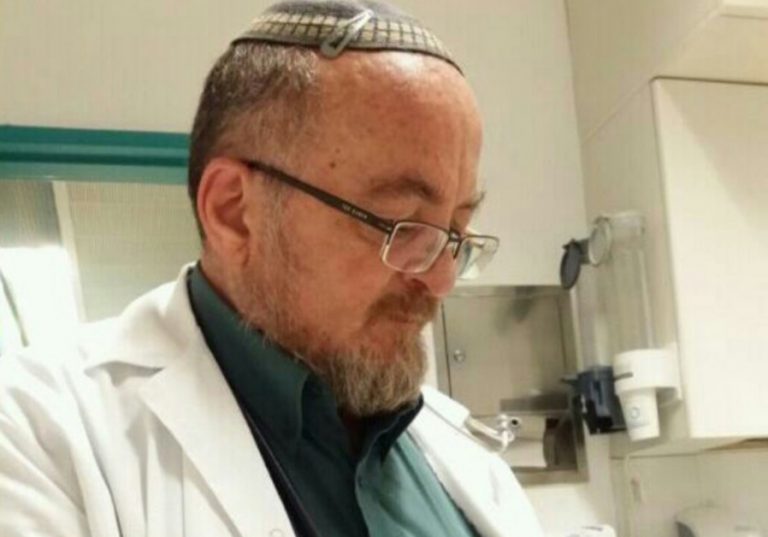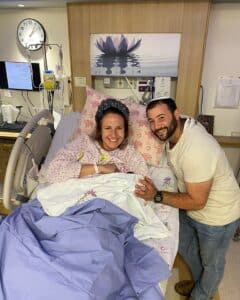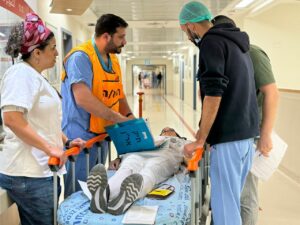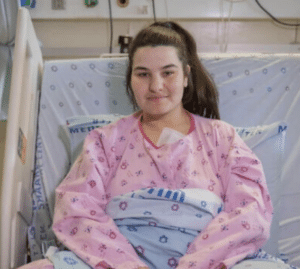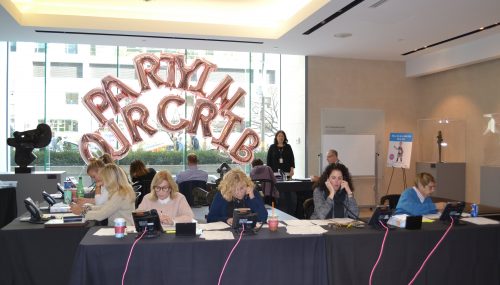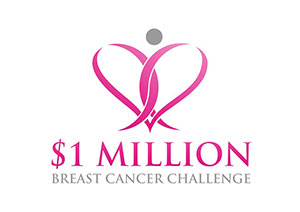Deep in the hallowed vaults of the Shaarei Tzedek cardiology unit, a senior doctor reigns, whose burning desire to help others was born out of a dark and torturous history.
In 1973, while serving in the IDF reserves, Binyamin “Beni” Mazuz, was captured and taken into Syria at the start of the Yom Kippur War. Behind enemy lines, witness to things no man should see, he decided that he was going to help others.
“When I was in Syria, I had to decide,” Dr. Mazuz told The Heart of Israel. “I had to hurt people, take out thorns and the like. Not that I had any training, but I did what I thought was right to help someone who was suffering. I was taking out thorns, and giving moral support to the group when the interrogators came to strike us. It was there that I decided that my future profession would be helping people who are hurting.”
In October, 1973, Beni Mazuz was on Mt. Hermon, serving as a reserve soldier in the IDF. Yom Kippur was drawing near, and he was called on to serve as the cantor on base.
It was there that the Syrians found them. Crashing through the hush of Yom Kippur, the tempest of war slammed into the Golan Heights. The soldiers fought a pitched battle, and suffered many wounded and dead, but the enemy surrounded them.
Beni Mazuz, and everyone else still alive on base, were taken captive.
“The moment that you fall into captivity is the most terrifying: the feeling of uncertainty about what is going to happen…there is no way to know if in the next moment they won’t fire a bullet into your head,” he said.
The men were forced to march 48 hours without food or water. The Syrians moved them quickly, pushing them on a grueling ten-day march to Damascus, while blindfolded, and with their hands bound. The blindfold would only come off if a man was taken to be interrogated.
“Before I was taken to my first interrogation, I was shaking from fear, and I even said Vidui, (the Jewish text for confessions that are said on Yom Kippur and before a person dies.) I was certain that I would not return alive, that they would kill me, because I had no military intelligence at al,” Mazus stated. “I told them that I am a religious man – as in, the cantor – and it turned out that they have respect for religious people.”
Unfortunately, that was only the beginning. Their captors tortured them with cruel precision. Pilots would receive special treatment: the interrogators hit them hard on the ears, in order to tear their eardrums, and ruin their sense of balance. Others were hit with uniquely painful bamboo poles.
“If someone didn’t show any pain, then he was hit even more. The pilot Avi Lenier was murdered during the tortures of our captivity. He knew state secrets that until today have not been revealed,” he reminisced. “There was another old Druze gnetleman who guarded in the Golan for the Mekorot [Water] Company, who also died.”
In their cell in Damascus, silence reigned. Terror and pain struck the Israeli captives dumb. Only once hope of release dawned through the cracks in their captivity, did they begin to sing songs together. They would tell each other riddles, and geometry problems.
Hope was not in vain. While Beni was held in the the darkness of Damascus, the families of the POWs did not rest. Beni’s own mother did not leave her house for the entire duration of his captivity; his father went so far as to meet the Pope, to pressure the President of Syria into negotiations. The pressure on the government finally bore fruit: after 8 months and 4 days, the captives returned home.
Once he was home, Beni turned his inner strength toward healing others, and healing himself.
“Everyone is born with abilities and talents, and you need to give it your all…it was not even a question: If I have the power to do something, then I would do it, and I would do it well. It was hard. What can you do? Life is not a picnic,” he explained.Before he entered into medical studies, his mother feared that he was taking on the responsibility of people’s lives – but that didn’t deter him.
“Until today, my mother asks me occasionally: ‘How do you know you haven’t killed anyone?’ I answer that I don’t decide who lives and who dies, rather the Almighty is the one who decides, and I do the best that I am able, and hope that I can save lives,” said the doctor.
Although still plagued by the shadows of Damascus, Dr. Mazuz began to build up his life. While still a medical student, Dr. Mazuz met his wife – her grandfather was his patient. They married, and continued to live in Jerusalem, until a friend invited them to join the fledgling town of Psagot, in the Benjamin Region, in 1984.
“It was important to hold onto our land, and persist. Keep going. Fight for what is ours,” Mazuz said.
Today, in the halls of Shaarei Tsedek Hospital, Dr. Mazuz guards the entrance to the “valley of the shadow of death” (Psalms 24:3), and fights to give each patient every chance at life. He divides his time outside the wards between Bible study, and his children and grandchildren – “They are my life.”He says that his time in Syria spurs him to treat every moment as a gift.
Mazuz added, “I will never forget my period in captivity. It remains with me as a trauma. I always go about with a feeling that my life is on borrowed time, and that something is going to come out and surprise me…it leaves a mark.”
As the holiday of Passover approaches, we can’t help but feel that Dr. Mazuz embodies the true essence of redemption. We are commanded, during the Passover meal, to tell over the story of the Exodus to our children, as if we ourselves experienced being freed from the Egyptian slavery. Who better to tell this story than someone who experienced his own personal “exodus.”
This article was originally published by The Heart of Israel and was reprinted with permission.


